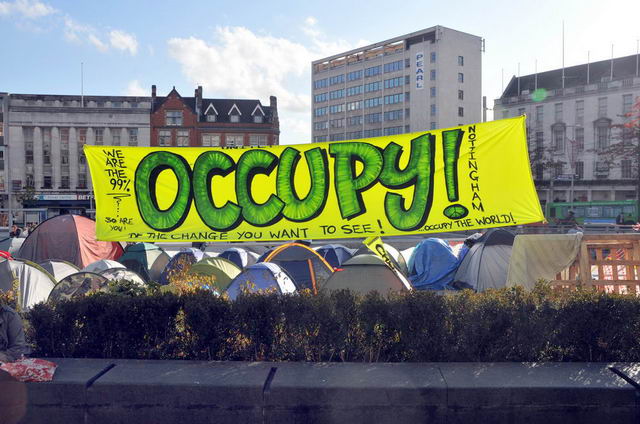
Occupy Movement Vol. 2 (Society’s Slideshow)
The Occupy Wall Street movement is showing no signs of stopping. It has expanded from Zucotti Park in New York City to Detroit, Los Angles and other major cities. People are gathering to protest the lack of available jobs, stagnating wages, and the overall stranglehold this banks and corporations have on our government.
Newt Gingrich has told Occupy participants to “get a job right after you take a bath.” Well, Newt, it’s kind of hard to get a job if you have no personal residence to give as an address or can’t afford a telephone to supply a potential employer with a number at which they can reach you if they decide to hire you or even call you in for an interview.
In fact, the entire Occupy Movement seems to be hinging on a sort of Catch-22. Participants are lacking a clear endgame or strategy to get there. They see the pathway as blocked at all turns and have decided instead to protest the control of the 1% over the 99%, unable to identify how they might win or when they have won.
The Occupy Movement is protesting that employers aren’t hiring. However, employers won’t hire if there is not enough business to justify adding new help. In order for the businesses to justify adding new help, people have to go to the businesses in question and spend money.
Does anyone else see a problem here?
The more people downsized from their jobs, the higher the unemployment rate. These people will immediately most of their budget excepting the bare necessities for human life (food, water, shelter, sanitation). That means that they are only spending their money at grocery stores, giving it to banks, and paying their utility bills to keep things operating smoothly in their home.
Similarly, if people are forced to take a pay cut, they have less discretionary funds to spread around to purchasing things that they would like to have versus raw needs. Less money spread around means that generally speaking, they will also focus on paying their utilities, buying food, and paying their mortgage or rent.
People who feel squeezed in their finances will not purchase new cars, and instead focus on fixing up their current one, or purchasing a used vehicle when it becomes absolutely necessary. This might lead to an auto industry lay-off, which will affect even more independent businesses in that they are not taking in nearly as much cash as previous years.
If an increasing number of businesses are forced to close due to lack of business or lay people off for the same reason, this limits even more people’s ability to pay all of their bills and have a bit left over for mad money.
The 1% can in no way, shape, or form spend enough money to stimulate our economy. Even if they are holding a huge sum of America’s cash in reserve, they can still only be in one place at one time spending their money on one thing. Generally, the companies that sell those things tend to be high-end retail and hire few people due mostly to their limited but rich clientele.
We could try a reboot of the Works Progress Administration and put people to work fixing our crumbling infrastructure. However, the question always becomes: “Where will the money for such a program come from?” America currently has no stomach for new tax-payer funded programs that reek with potential for mismanagement. Not that the WPA was mismanaged, but today is a different time than the 1930’s
To get money for a WPA-like infrastructure repair we could ask corporations like GE who post record profits and pay zero in taxes due to funny accounting methods to actually pay their taxes. However, this leads to the corporations claiming that if they have to pay all those nasty taxes, they’ll have to lay off workers just to break even. They don’t share information on the fact that they’ve reinvested every penny of their profits in their overseas operations. (i.e. not in America)
There is no easy way to put Americans back to work. Society has mired itself in the mother of all Catch-22’s. Employers aren’t hiring because of lack of business, and people aren’t buying because lack of monetary means to do so.
Perhaps participants in the Occupy movement could flood their U.S. Representative’s and Senators’ office lines with phone calls while they are out marching. They should also mass mail letters to politicians to bog down their mail rooms. Once the secretaries and mail room employees threaten to quit unless they do something to stop the madness, well that’s when political change will happen.
Politicians are inextricably beholden to the voters for their jobs. Once a politician becomes aware that public opinion of his policies have fallen in disfavor, he can either change or face the possibility of getting voted out of office. All people need to do after they make politicians aware of their displeasure is vote for a candidate that is more aligned with their opinions about how society should be managed by its leaders.




